Recognise and regulate the holy cow
D Shyam Babu
Senior Fellow, Centre for Policy Research, New Delhi
On February 2, 2018, BJP leader Subramanian Swamy introduced the Cow Protection Bill, 2017 in the Rajya Sabha. Though he withdrew it on the same day following assurances by the government to consider the matter, the Bill is a sound policy initiative.
Cow vigilantism cannot be tackled without addressing the status of cow as a holy animal. The failure to think through the problem and bring about some order has left us in a bizarre situation: those who, by faith and in practice, do not worship the cow are punished for cow slaughter, while those who worship the cow have no obligations in terms of how one is to treat the animal, how is it to be looked after in old age and prepared for death, etc. Similarly, there is no agency at any level that keeps records of cows and their owners. In such a situation, it would be the mob that becomes judge, jury, and executioner.
Hindus revere the cow as holy and it is hard to counter why their religious sentiment cannot be accorded the formal dignity it deserves. The contention that how a secular Constitution could have given effect to a religious requirement is valid but the subject is a fit case for granting an exception. One must also recognise that the logic of secularism has produced only policy paralysis on this matter.
What is a holy cow?
The only place 'cow' finds a mention in the Constitution is in Article 48, which is a non-justiciable directive principle, in the context of organising "agriculture and animal husbandry on modern and scientific lines." But it cannot be a ground for not protecting cow as a holy animal. Thankfully, several states have laws against cow slaughter. But none of these laws is specific about what it seeks to protect and how the bureaucracy is to implement it. Rajasthan even collects the Cow Protection Tax but it is not clear how the government spends the money.
Consider how Judaism (by extension, Islam, but not Christianity) determines pig as an unclean animal and hence pork not fit for human consumption. The Levitical injunction is that an animal is unclean if it does not have a split hoof and/or does not chew the cud, and the latter being the case with pig. This distinction between holy and unholy may not stand scientific scrutiny, but as a religious injunction, it is as clear as daylight.
What about the cow? Is a Jersey Cow holy? Are cows in Pakistan holy?
Aspects of cow protection
Dr Swamy's Bill takes into consideration three aspects of cow protection.
1One, it restricts the status of holy animal to the famous humped cow going by the scientific name of Bos indicus (aka Brahmin cow). Traditionally, a cow becomes holy when it is gifted to a Brahmin. The obvious inference that cows owned by lower castes are not holy may be sound in theology but politically untenable. Thanks to democracy and the rule of law, we no longer have the luxury of confining holiness to a few fortunate cows in the care of Brahmins.
Historically, what the Hindu scriptures called holy and what the faithful worshipped is Bos indicus. A religion rooted in one soil and confined to one people could not have meant all cows on the planet are holy. Herein lies an opportunity for creative policy intervention which satisfies one group's need to protect the cow as holy, while allowing others' the right to eat beef. The way could then be paved for import of both beef and foreign, unholy breeds for human consumption.
2 Two, the Bill proposes the National Cow Protection Authority to both "stabilise" the population of Bos indicus and prescribe norms on how to take care of the animal. The Cow Dignity Index could be, hopefully, a way to expect and impose obligations on the part of cow owners; ironically, it could be a deterrent of sorts to owning a cow.
3 Three, the proposed capital punishment for cow slaughter is bound to be controversial but it must not prevent us from unpacking the problem. Both real and imagined cow slaughter remains a major law and order concern. It was the case even in the nineteenth century. One legitimate fear is that death penalty would end up being the legal lynching of Dalits and Muslims. If not death penalty, some penal action is warranted if the cow is to be honoured and protected.
In a situation where non-Bos indicus cows are available for slaughter, non-Hindus will have little reason to touch the holy cow. For example, people in the North-East would be free to slaughter cows as they are non-Bos indicus variety, something Dr Swamy mentioned in the Rajya Sabha. What's more, it would be quite an ordeal for the Hindus owning the cow to fulfil the requirements of care in its old age till death.
The Constitution of India may be secular, but it is not atheistic. It is expansive enough to accommodate religious sentiments of both the minorities and the majority community. Is it a sound policy to deny a social reality as intense and widespread as people's reverence for the cow? India's secular credentials would not suffer any more damage if the government recognised the cow as holy and stipulated what it meant in law and also provided institutional scaffolding.
Views are personal









